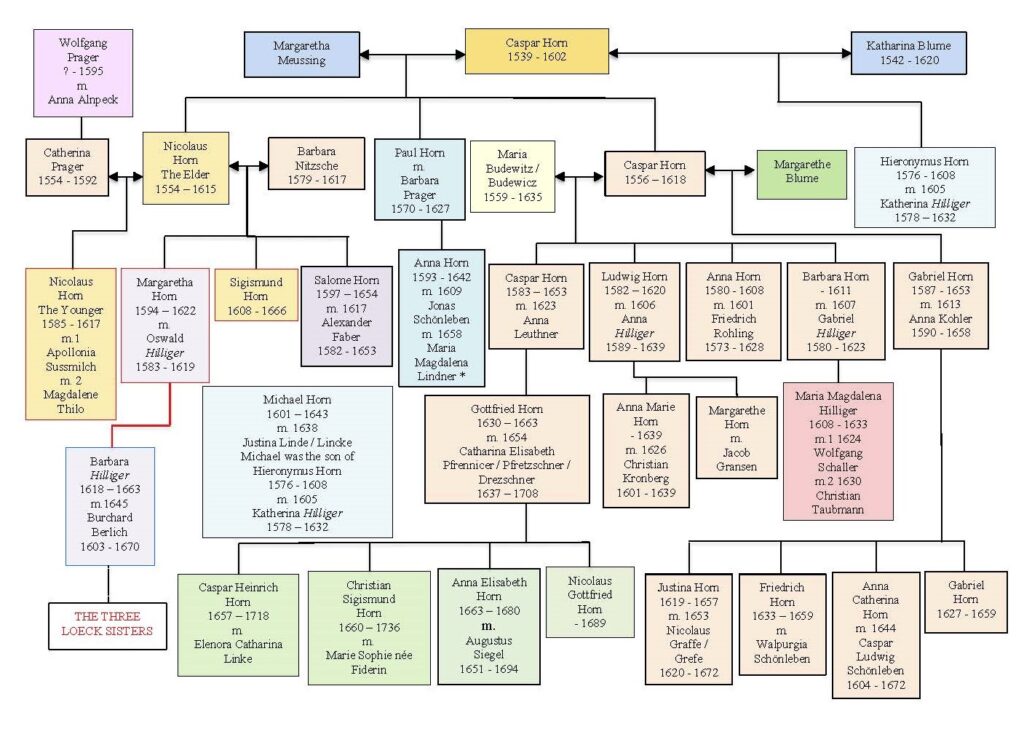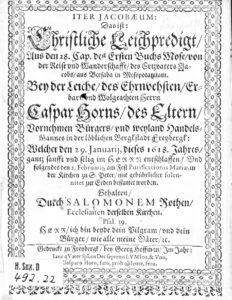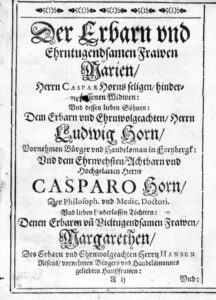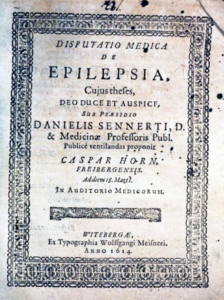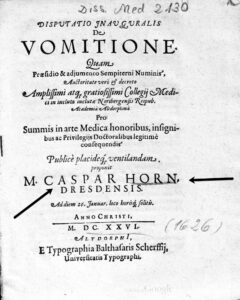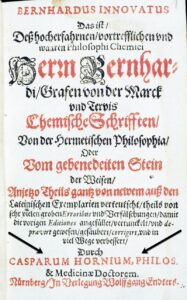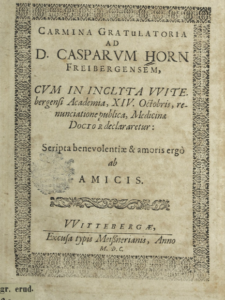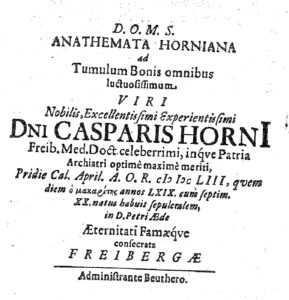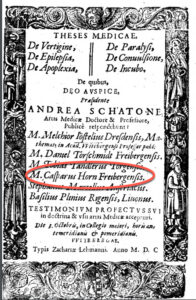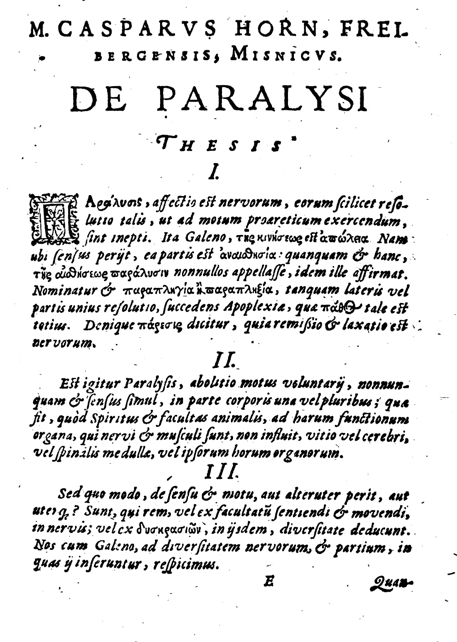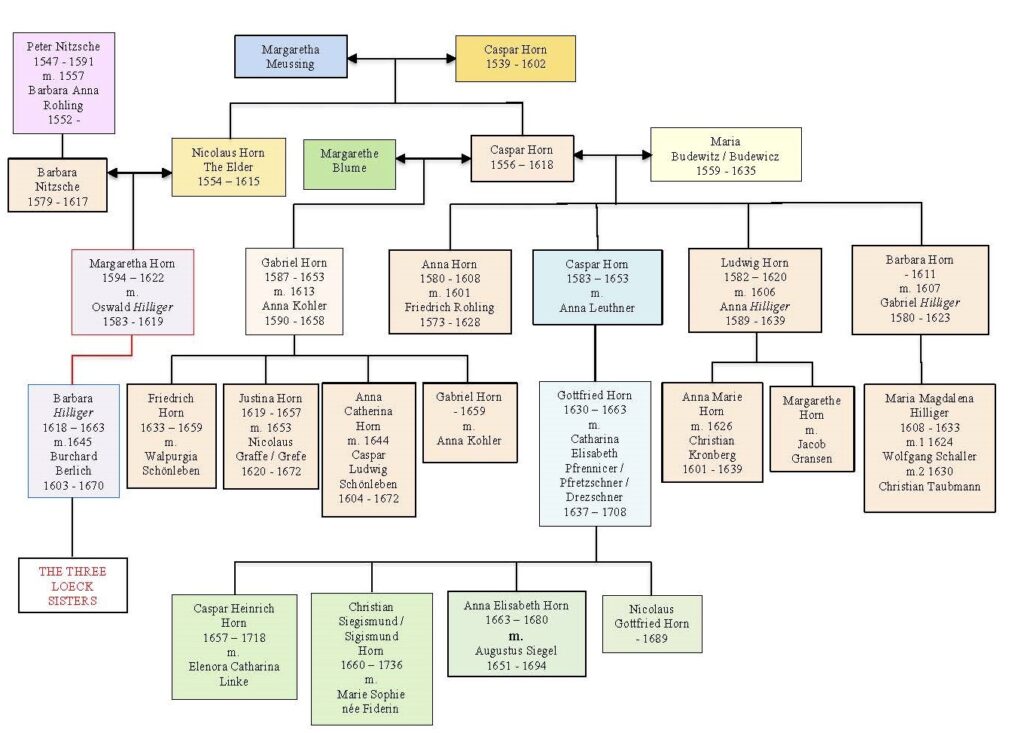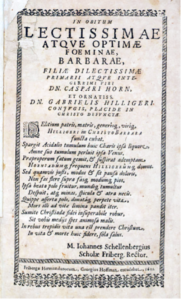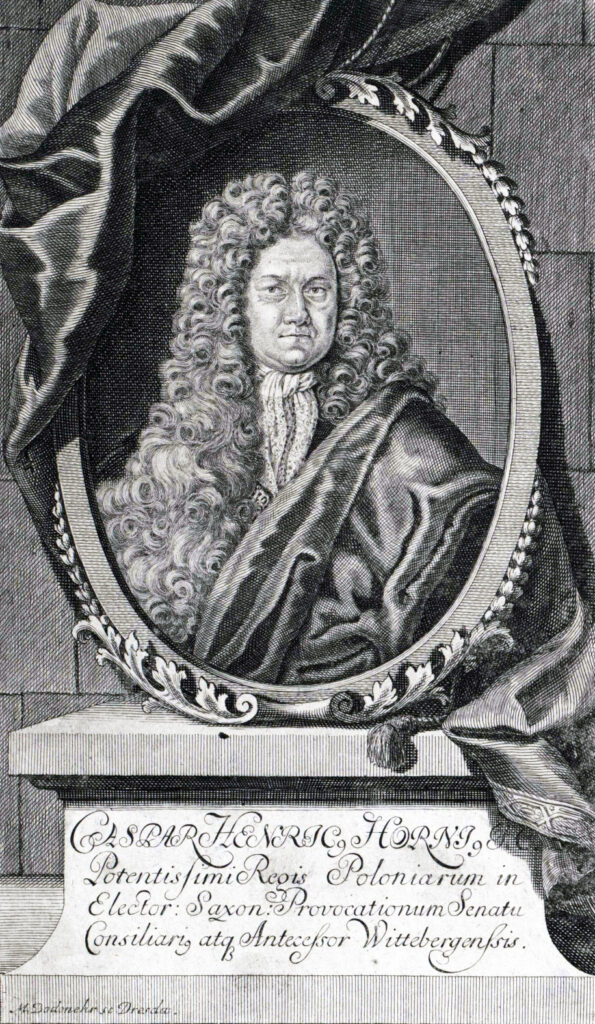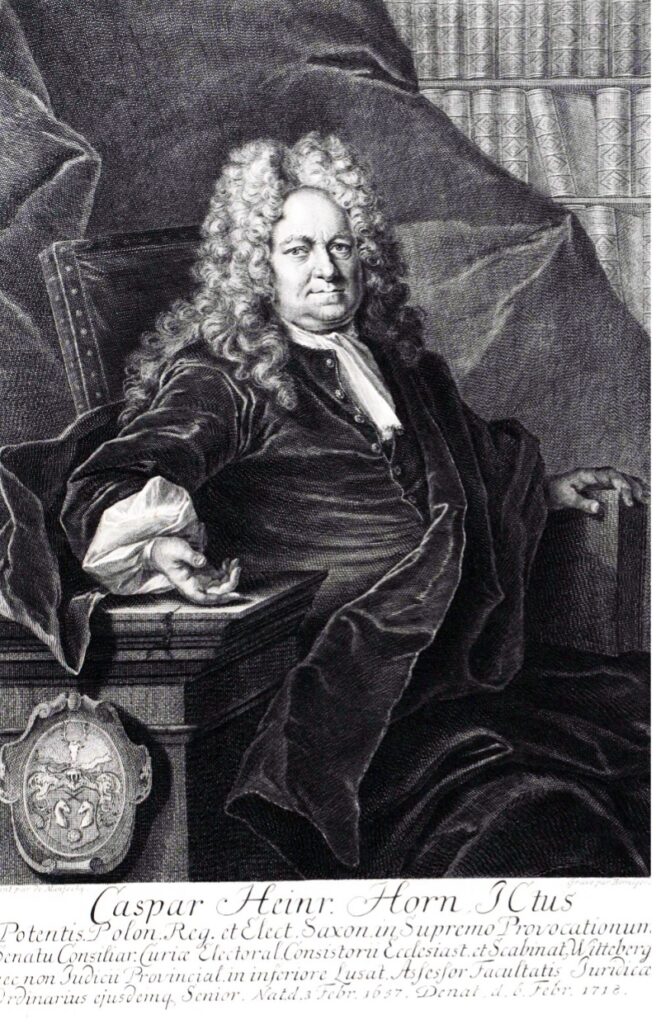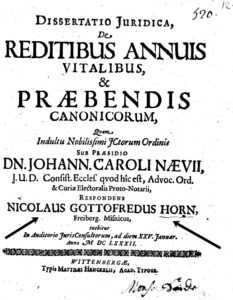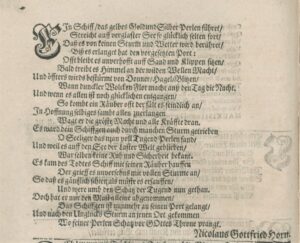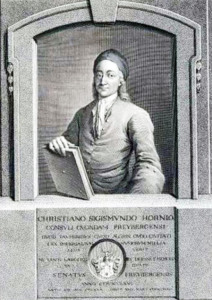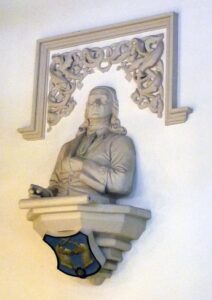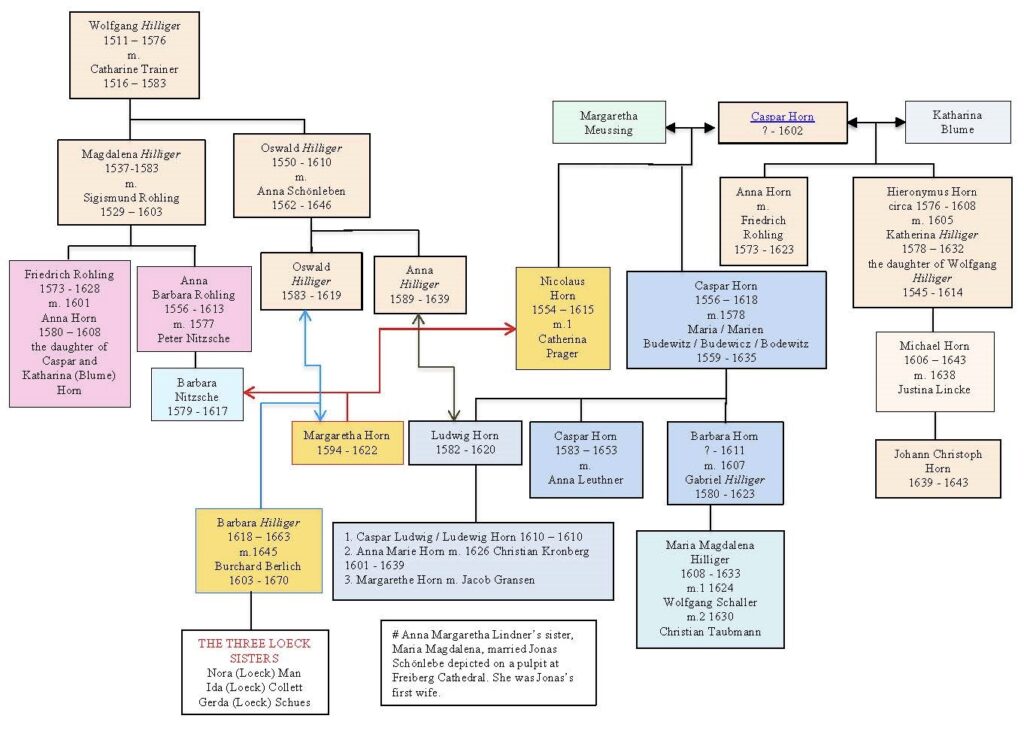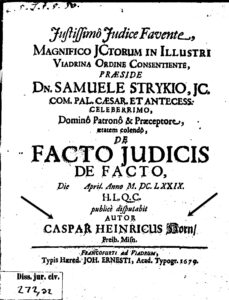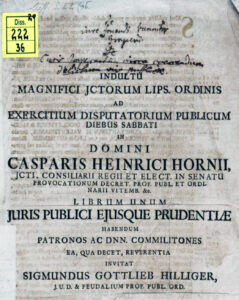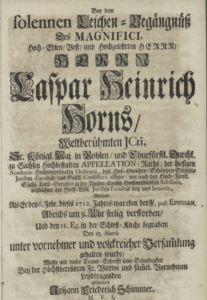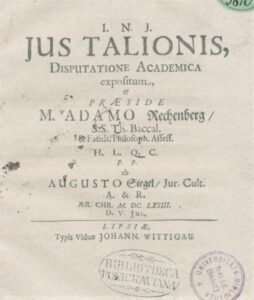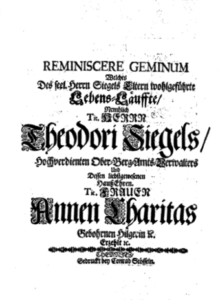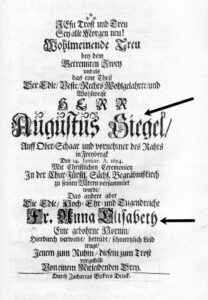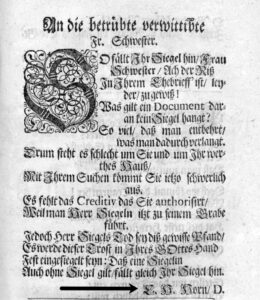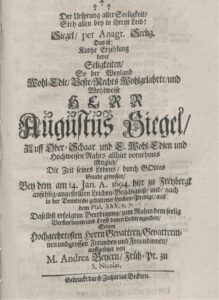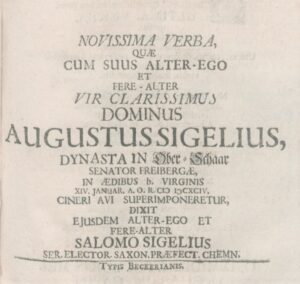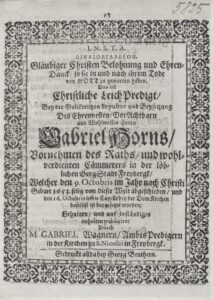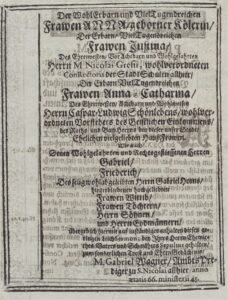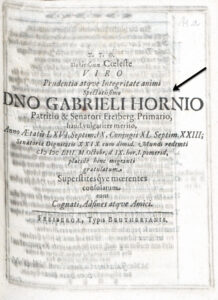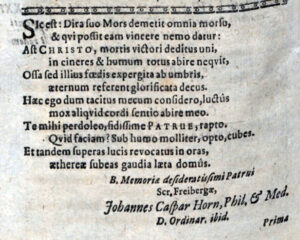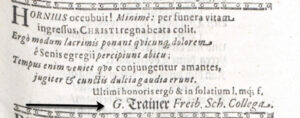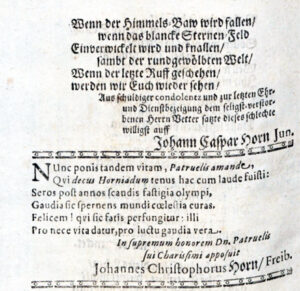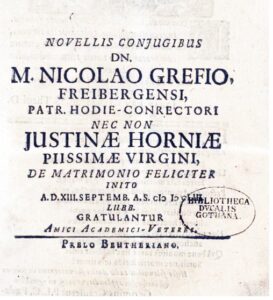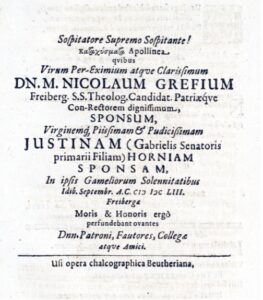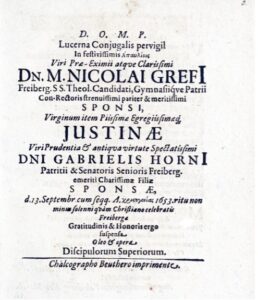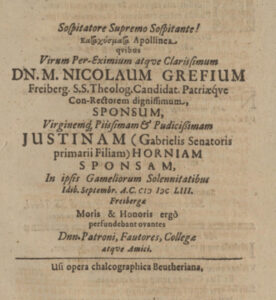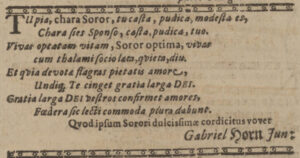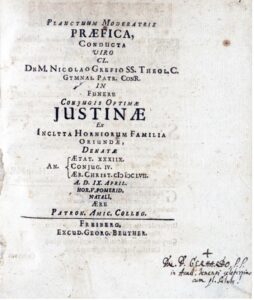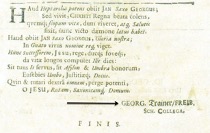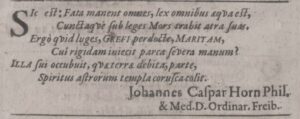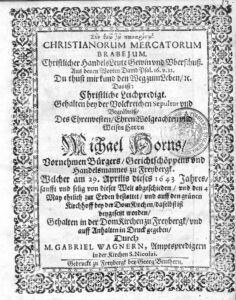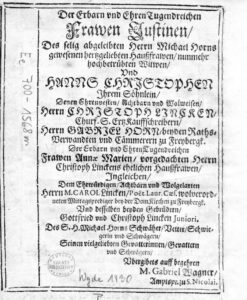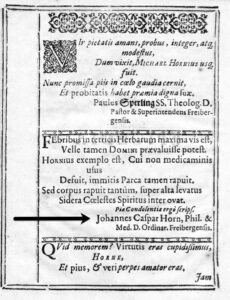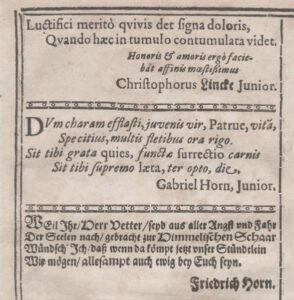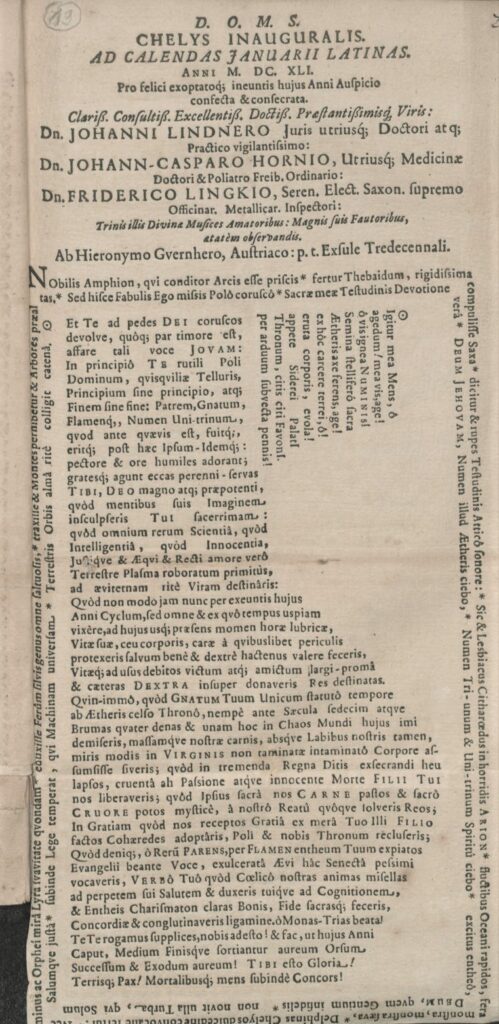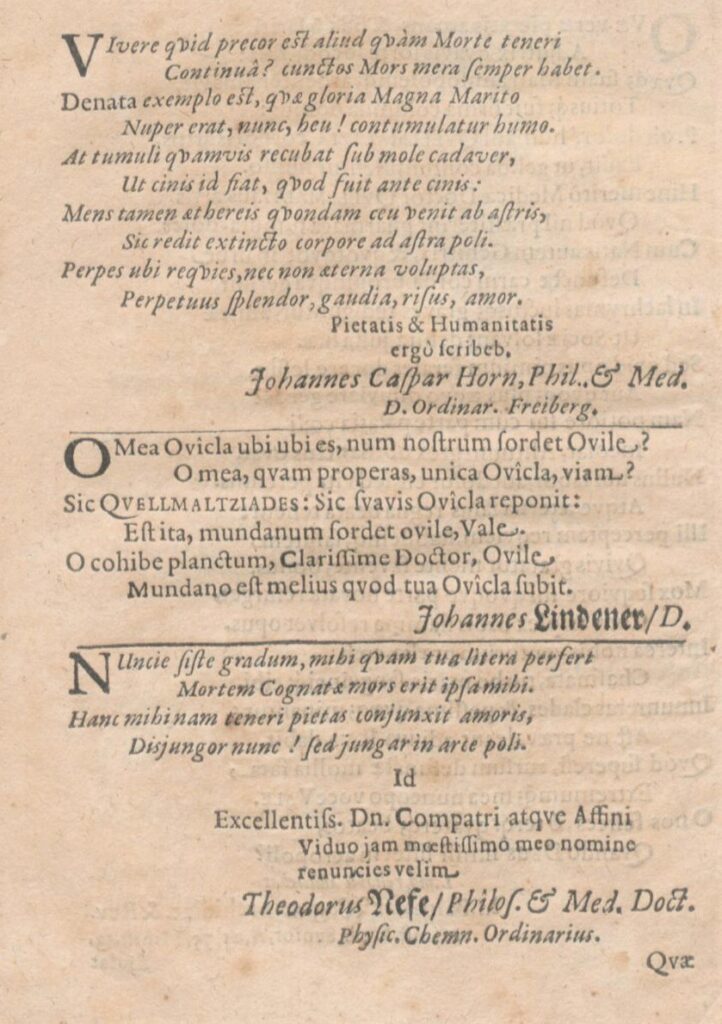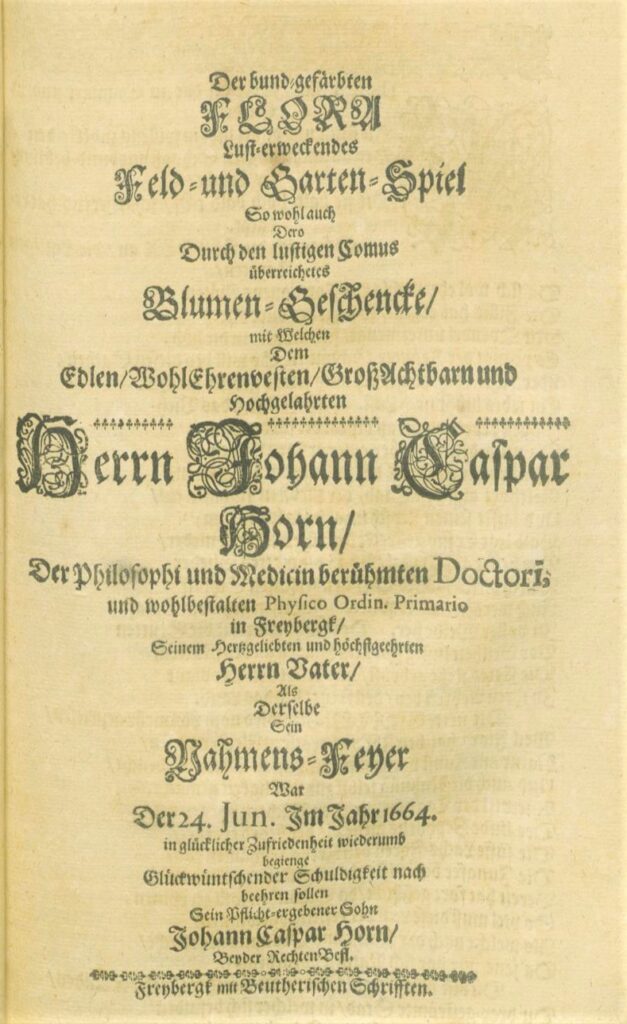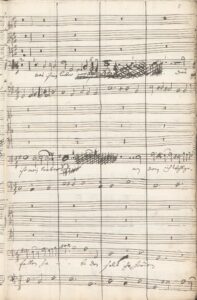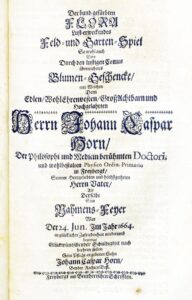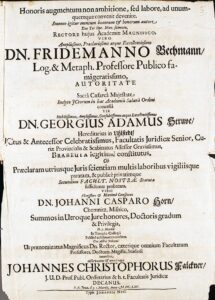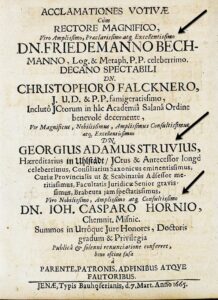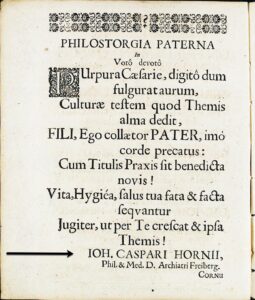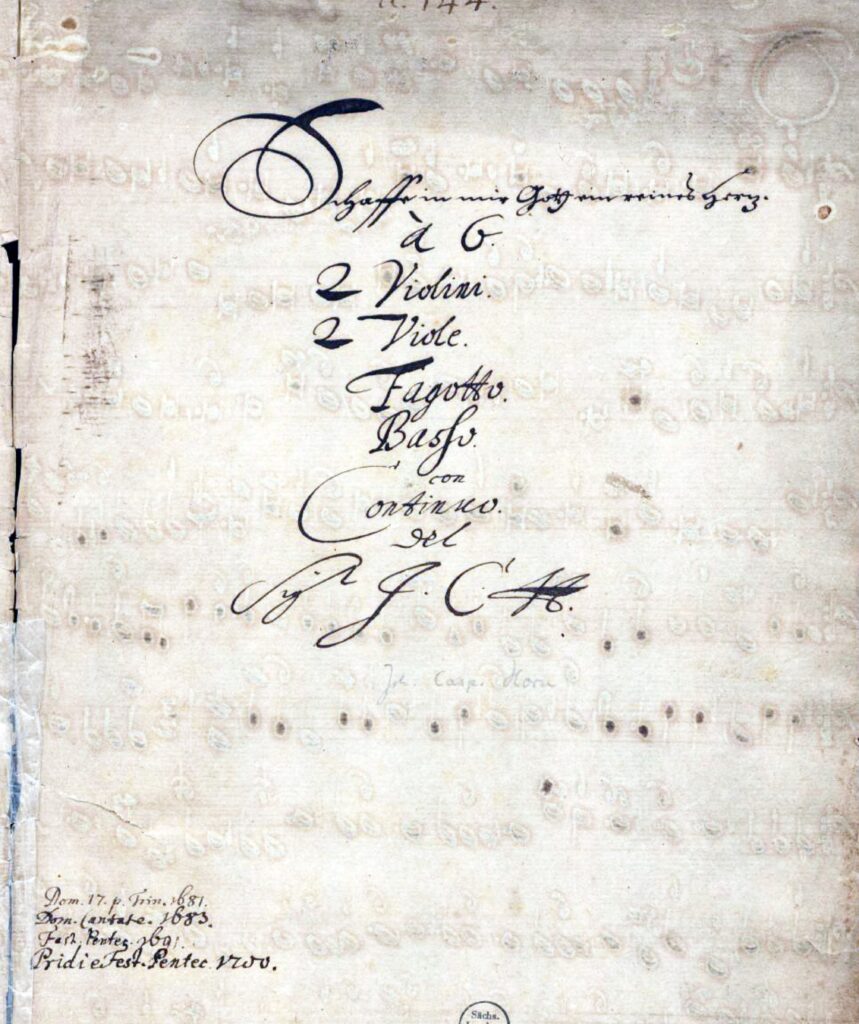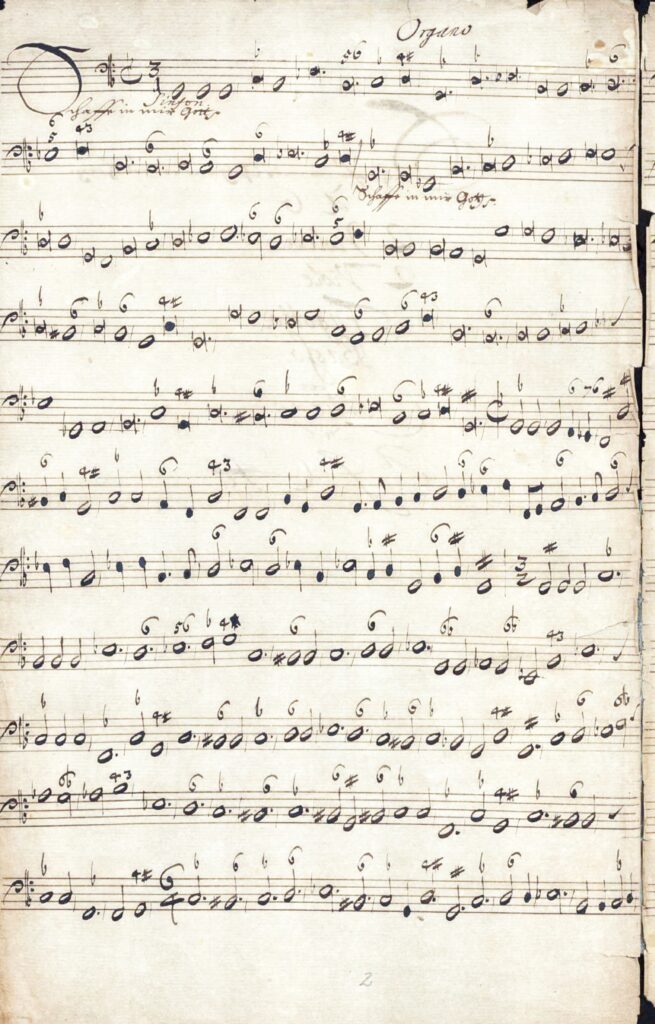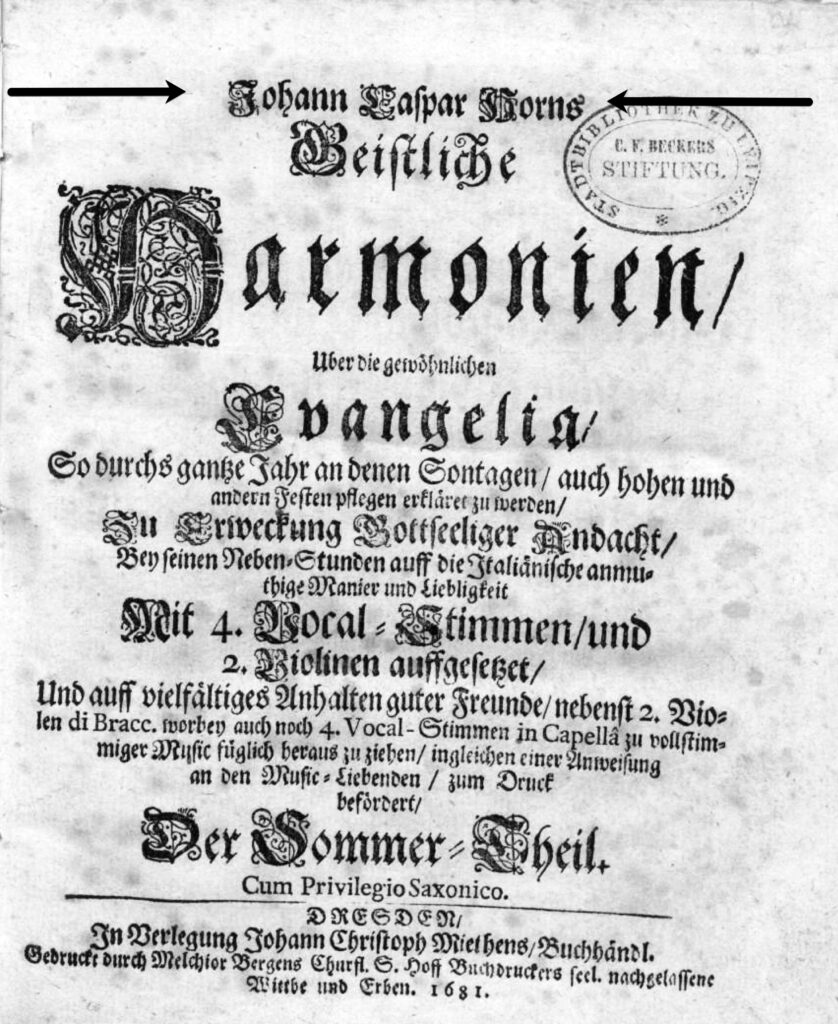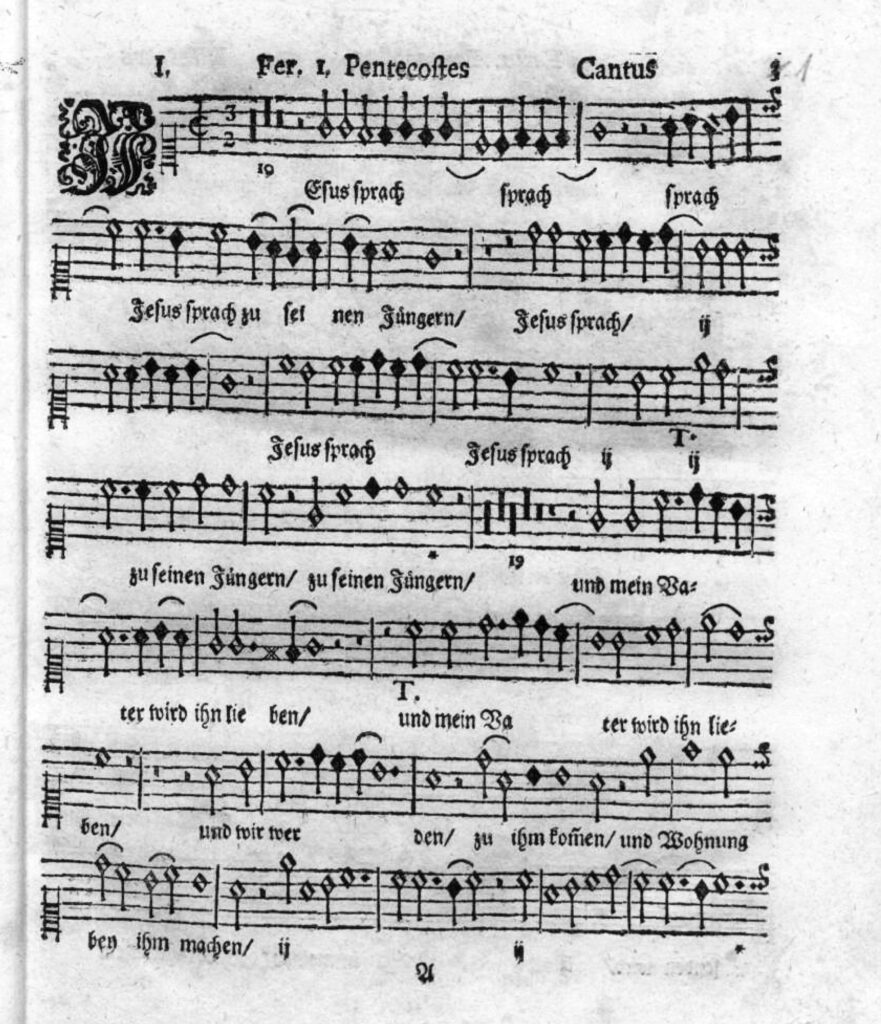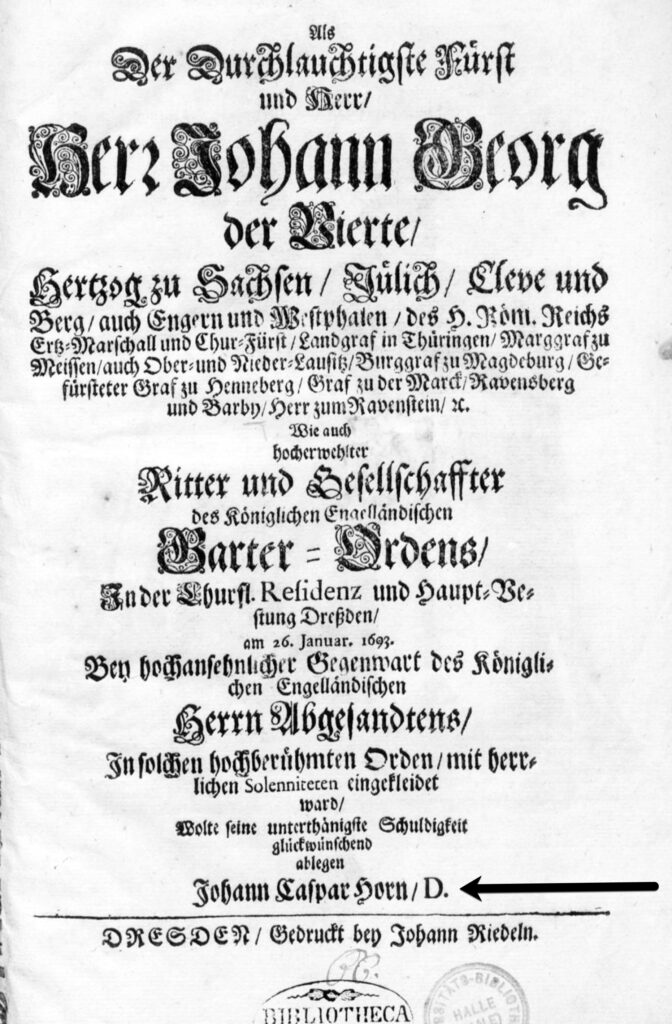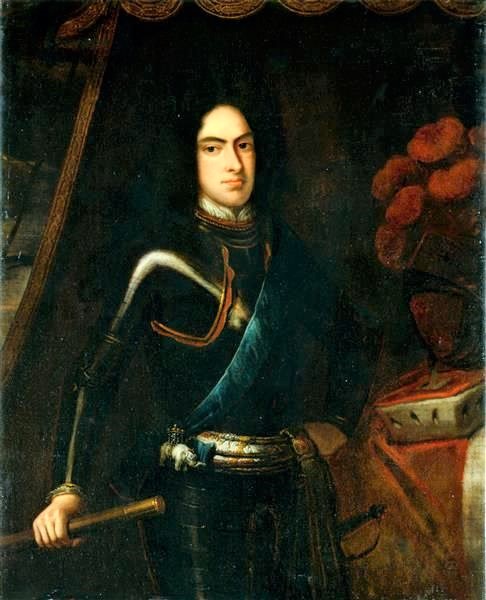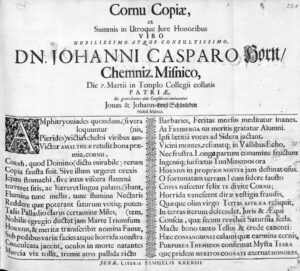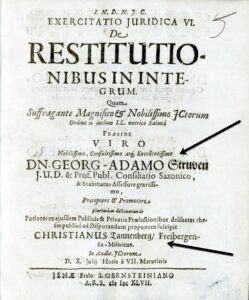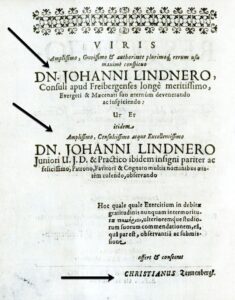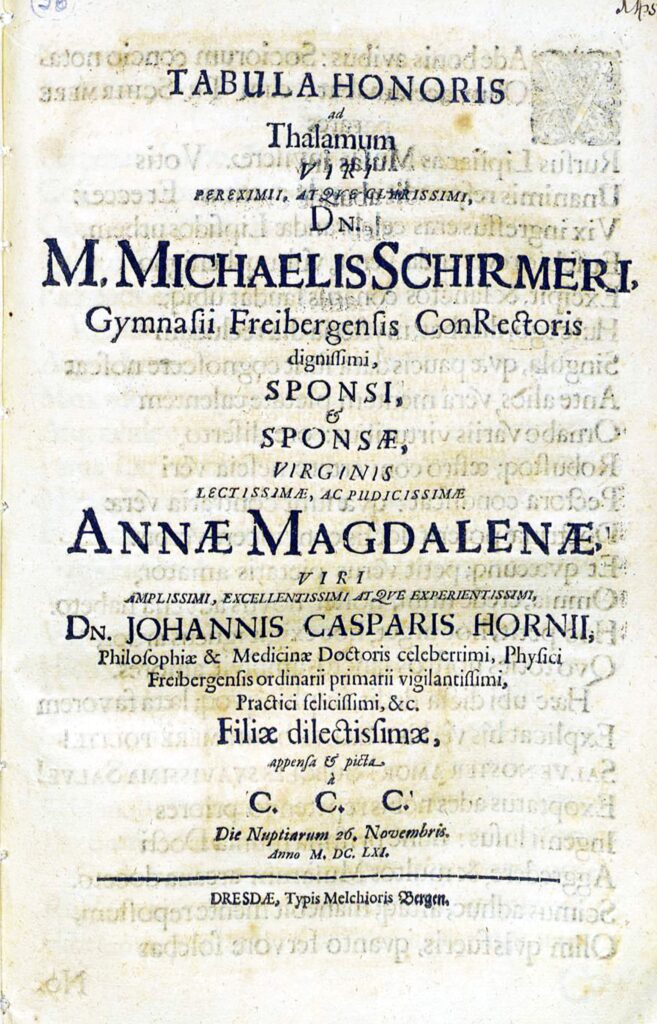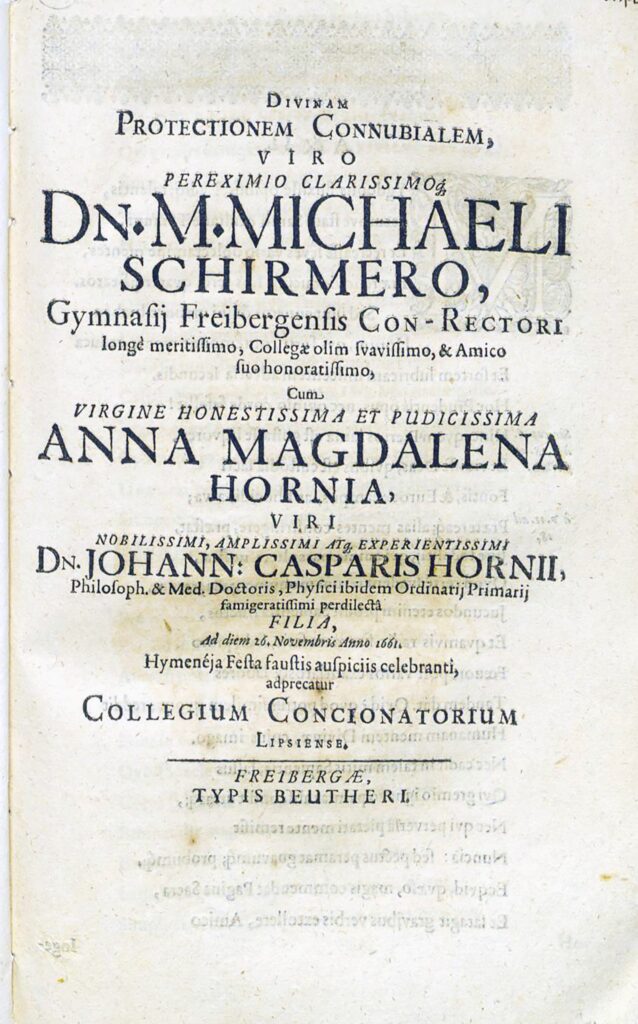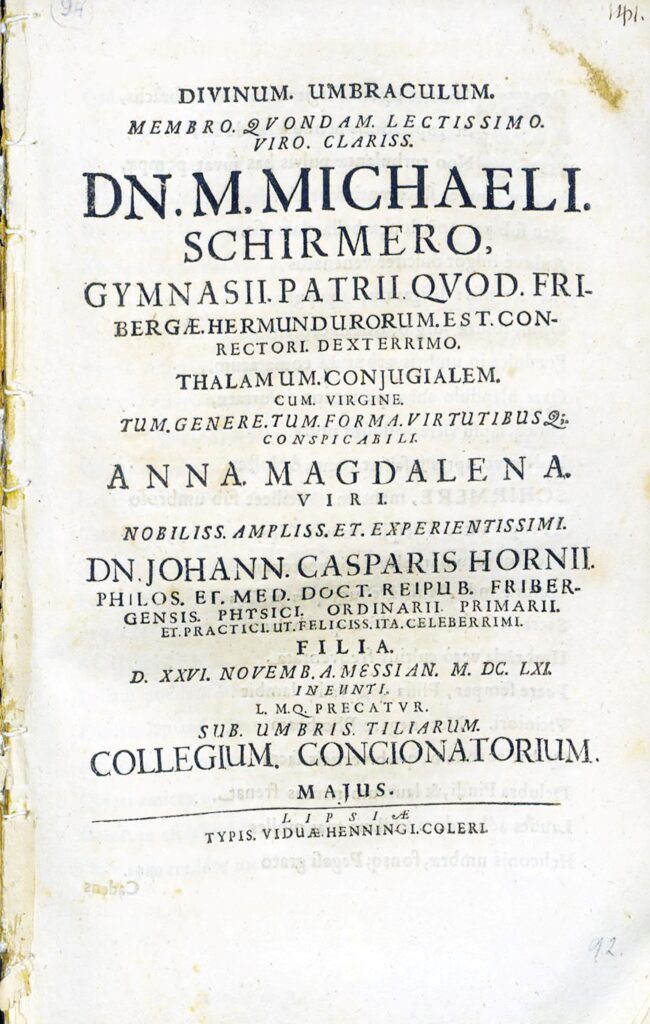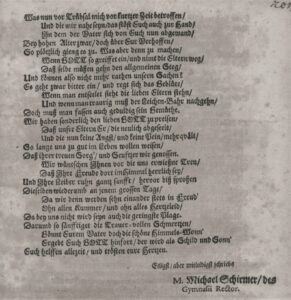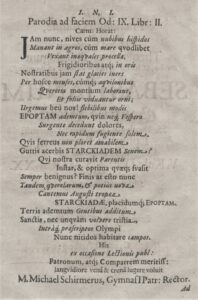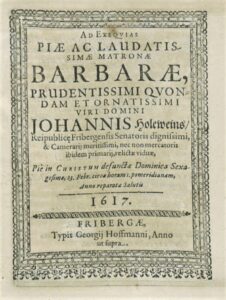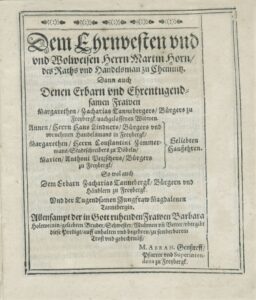For the purposes of this website the Horn family has been divided into two. The branch from which The Three Loeck Sisters descend can be found here, On this page we describe a branch of the Horn family in which the first name of ‘Caspar’ is popular and which presents a challenge when studying the family. The chart below shows some basic Horn relations. However, the genealogical records of this family are confusing and the chart below is tentative and subject to revision. However, as far as the bibliographic record is concerend those whose first names were either Caspar or Johann Caspar and who published works (including musical scores) between 1500-1700 and where the work was associated with places such as: Freiberg, Leipzig, Dresden, or Wittenberg are more than likely to have been members of the Horn family described on these pages.
Before diving into the various Caspar Horn mentions there is Paul Horn, the brother of Nicol and Caspar Horn. Paul was born at Freiberg on 9 April, 1593, and he died at Freiberg on 18 September, 1642, and was buried in the Cathedral on 25 September, 1642 (funeral sermon available). He married Barbara Prager, at Freiberg on13 January, 1601. She died on 5 April 1627. They had a daughter Anna who married Jonas Schonlebe. Below Barbara’s funeral sermon book (see Deutschland, Saxony, Frei…eichenpredigten 1614-1661 Band 01 LP 29).
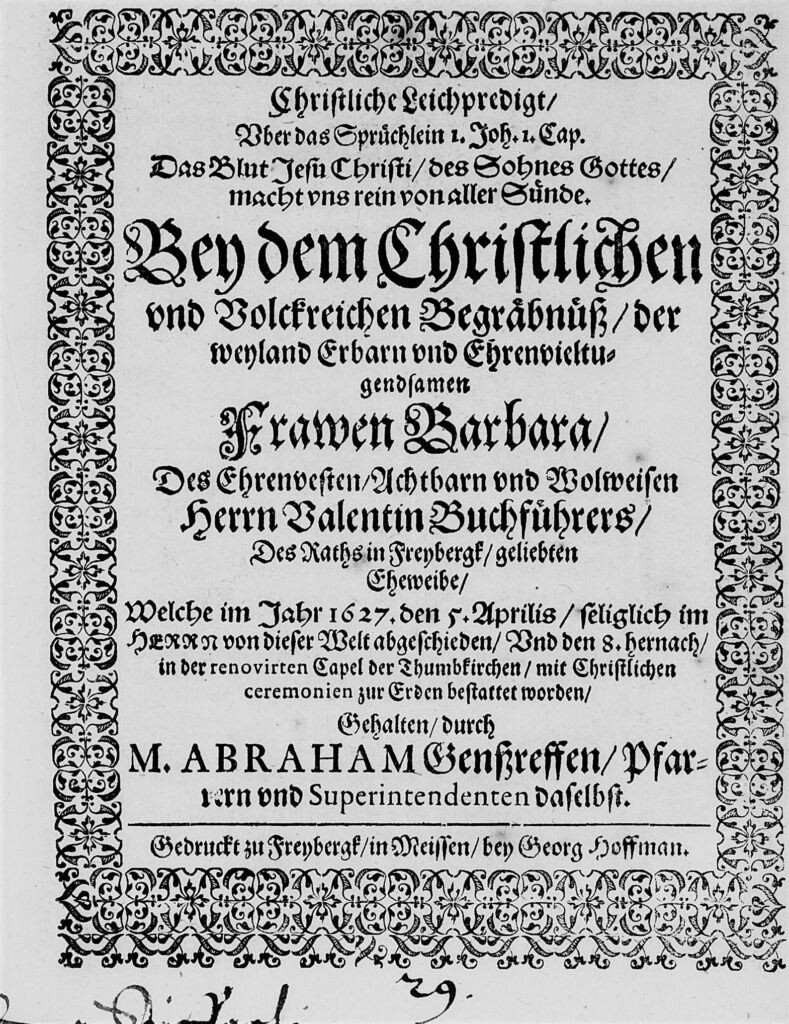
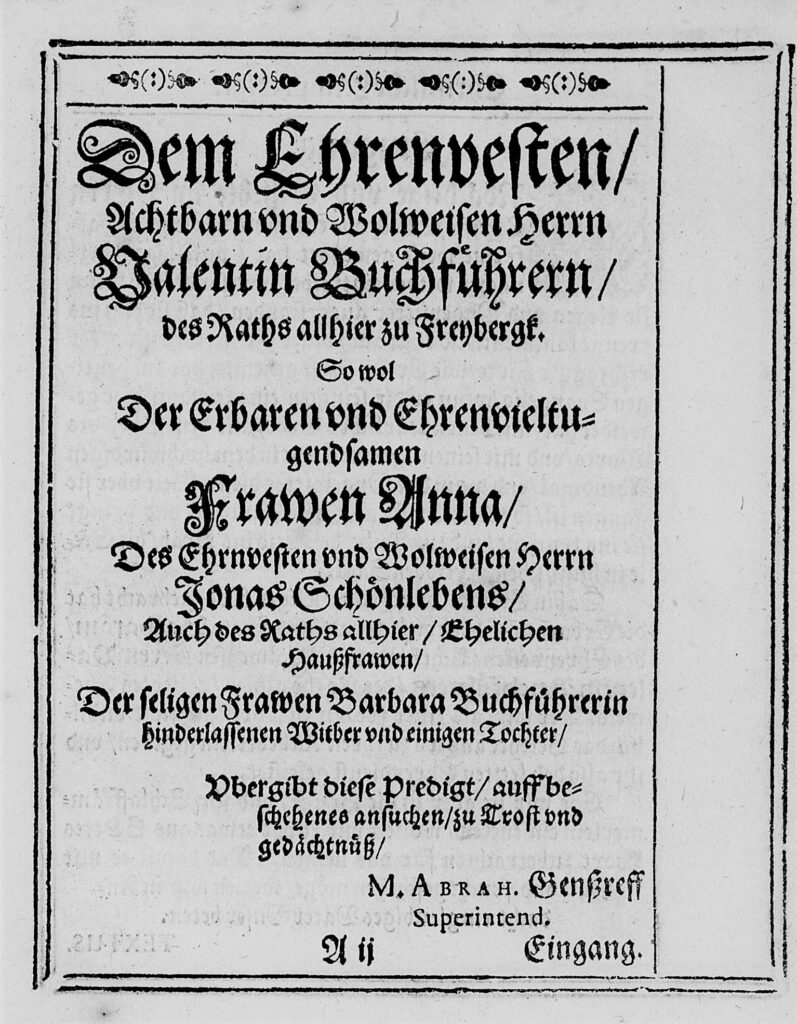
An early mention of a Caspar Horn occurs in 1543 when a Caspar Horn takes a legal fight against the citizenry of Bautzen for damages he claims they had incurred on his property at Güter Klein Düben. But as there is no knowing if this Caspar is one of ours or not, we move on to … Caspar Horn (1556 – 1618) who married Maria(n) Bodewitz / Budewitz (see chart above) upon whose death a funeral sermon was published under the title: Leichpredigt bey der Leich des Herrn Caspar Horns …
There were a number of Caspar Horns writing in the 16th and 17th centuries, one of whom Caspar Horn (1583 – 1653) (see above) was writing on both medicine and philosophy. In 1614 Caspar published: Disputatio Medica De Epilepsia and in 1616 he published: De Arthritide …
In 1626 this same Caspar published: Disputatione Inauguralis De Vomitione … and in 1643 he edited and improved upon the work: Bernhardus Innovatus Das ist, Deß hocherfahrnen, vortrefflichen vnd waaren Philosophi Chemici Herrn Bernhardi, Grafen von der Marck …
In 1600 the faculty of Wittenberg University published Carmina Gratulatoria Ad D. Casparvm Horn Freibergensem (Songs of Congratulations to Caspar Horn) and (right) Anathemata Horniana …
An undated publication tiled: Resp. Theses medicæ, de vertigine, de epilepsia, de apoplexia, de paralysi, de convulsione, de incubo … presented a series of essays on “dizziness, epilepsy, apoplexy, paralysis, convulsions, nightmare” each by different doctors including Caspar Horn whose contribution was on paralysis.
In 1611 Barbara (Horn) Hilliger, the daughter of Caspar Horn and his wife Maria Budewitz / Budewicz and the wife of Gabriel Hilliger (see chart), died and a funeral sermon book was published under the title: In Obitum Lectissimae Atque Optimae Foeminae, Barbarae, Filiae Dilectissimae Primarii Atque Integerrimi Viri Dn. Caspari Horn, Et Ornatiss. Dn. Gabrielis Hilligeri Coniugis, Placide In Cristo Defuctae … roughy translated as: “In the death of the most exemplary and the best of women, Barbara and the most beloved daughter of the principal and honest man Dn. Caspar Horn, and … Dn. Gabriel Hilliger his wife, calmly in Christ”; a sermon was preached by John Schellenberg of the School at Freiberg, Rector.
[It should be noted the large number of Hilliger – Horn marriages …. ]
Gottfried Horn (1630 – 1663) was the son of Caspar Horn (1583 – 1653) and Anna Leuthner. He was a member of the Council College of Freiberg and also the administrator of the two Hospitalers of St. Johannis and St. Bartholomew. He married on 9 October 1654 Catharina Elisabeth Pfretzschner (Pfrennicer / Drezschner) (1637 – 1708) . Gottfried died in the 34th year of his life on May 8th, 1663, at a time when his children were still young. Gottfried left his family with the Obererschaar estate, along with inherited dishes and furniture, but also, it seems, probably not a great fortune. Elizabeth the widow and her four children who shared in this estate were: Caspar Heinrich Horn, Professor at Wittenberg; Christian Siegismund / Sigismund Horn (1660 – 1736), Mayor of Freiberg; Nicolaus Gottfried Horn, (died as an army ensign unmarried in 1689); and Anna Elisabeth Horn.
Before dying an ensign, Nicolaus Gottfried Horn had time to write: Dissertatio juridica, De reditibus annuis vitalibus, & præbendis canonicorum, quam … sub præsidio dn. Johann. Caroli Nævii, … respondens Nicolaus Gottofredus Horn, Freiberg. Misnicus, tuebitur in auditorio JurisConsultorum, ad diem 25. Januar. anno 1682. And before that in 1677 he made a contribution to the funeral sermon for Michael Maukisi titled: Lacrymae in Obitum immaturum Adolescentis Optimi, & Optimarum artium Studiosissimi Samuelis …
Christian Siegismund / Sigismund Horn (1660 – 1736), the brother of the above, was admitted as a pupil to the Freiberg city school by the then Rector M. Michael Schirmer on April 16, 1670 (therefore in his 11th year). At about this time Christian’s mother married the city councilor and district tax collector Martin Albert, a very educated man who had traveled a lot and who died in 1718 as Freiberg’s mayor. Indeed, the fact that Martin had got to know the world on his travels seems to have awakened in Horn’s mind the desire to do something similar; because when an epidemic disease broke out in Saxony in 1680, he went on a journey using some of his father’s inheritance to travel to England, Holland, France, and Italy. There is nothing to be found about when he returned to Freiberg. Around December 23rd, 1682 he became a member of the local Kramer guild and also gained citizenship of the city. In 1685 he married Marie Sophie née Fiderin, the daughter of the raft master Ficker auf Niederauerbach. The marriage was childless and as a result Horn was induced to adopt a poor boy, George Friedrich Ettenhuler. On May 20, 1708, Horn’s mother died, leaving behind her second husband (Martin Albert) and her four children mentioned above.
In 1697 Christian Siegismund / Sigismund became a Freiberg city council member where he developed a “lively administrative activity in a wide variety of departments”, including mining and city treasury matters. After the onset of physical ailments, Horn requested in 1719 that his council activity be suspended and, in the following year, he applied for temporary retirement. In 1722 he was active again as a council member, and in 1723 he was elected, against his will, to succeed the late mayor Schmieder. In his new role, Horn initiated several reforms of the council. In 1730, at the age of 70, he asked again for a retirement, but remained in office at the insistence of his friends. In 1735 his sister Anna Elisabeth died, who had appointed him as her heir to a large fortune, from which, among other things, a foundation for the city of Freiberg in the amount of 70,000 thalers was established and which Horn had ordered in his will shortly before his death in 1736. There are no bibliographic records that carry his name, as far as we can tell.
Caspar Heinrich Horn (1657 – 1718) was the brother of the above and son of Gottfried Horn (1630 – 1663) and his wife Catharina Elisabeth Pfrennicer / Pfretzschner / Drezschner (1637 – 1708).
He attended the Freiberg city school and high school and in 1675 he moved to the University of Leipzig, where he held his first disputations and in 1677 he moved to the University of Frankfurt (Oder), where he studied law. In 1679 he returned to his hometown, and then went to Tennstädt to run a law practice and a year later he made a trip to Holland, France and Switzerland. After returning to his homeland in 1680 from his educational trip, he found a job that took him to Germany and France as a secretary.
In Wittenberg he started studying again on July 22, 1684, and he obtained a licentiate in law on December 15, 1684, and was appointed to the city council in Freiberg in 1685. He received his doctorate in law on October 8 of the same year. After working as a city judge in Freiberg in 1686, he received a call as an assessor at the law faculty of the University of Wittenberg on August 1, 1687. He also became an attorney at the Wittenberg court court in 1688, and on June 14, 1690 professor at the law faculty of the Wittenberg academy. After he was promoted to assessor at the Lower Lusatia regional court in 1700, he became assessor at the Wittenberg consistory in 1709, member of appeal in 1709 and, finally, in 1713 as head of the law faculty, its full professor, which he remained until the end of his life. Below right Caspar Horn published In dultu Magnif. Ictorum Lips. Ord. ad exercitium disputatorium publ. diebus sabbath. in C. H. Hornii … librum unum iuris publ. eiusque prudentiae habendum which included Sigismund Gottlieb Hilliger.
During his Wittenberg professorship, Horn was mainly active in the field of constitutional law, which he introduced into regular academic teaching. In addition, his lectures included the general basics of constitutional law. In addition, Horn was dean of the law faculty 9 times and in the summer semesters 1691, 1699, and 1715 rector of Leucorea and also in 1705 the institute’s prorector.
In 1709 Caspar Heinrich published Disputatio Inauguralis Juridica De Processu Summario : Ex §. IIX. Resol. Elect. Saxon. Noviss. / Quam … Praeside D. Casp. Henrico Hornio JC., atque Antecessore, Potentissimi Regis Polon. & Electoris Saxoniæ… It also included a closing poem (below right) by Luder Mencke who was the cousin of Otto Mencke who married the Three Loeck Sisters Nth great aunt Magdalena Sybilla Berlich.
In terms of genealogy, it should be noted that he married Elenora Catharina, the daughter of the superintendent Christian Gottfried Lingke/Lincke, on September 30, 1685 in Freiberg. [Her brother was Gottfried Salomon Lingke]. From this marriage the children are: Elenora Henrica Horn (born October 13, 1687, married 1706 in Freiberg with D. Otto Friedrich Lange, consultant in Dresden), Rachel Catharina (born May 17, 1689 in Freiberg, married September 27, 1712 with Dr. med Jacob Bartelmaei in Dresden), a son (* April 20, 1691; † July 19, 1691), Bengina (* February 27, 1692; † March 1, 1692) known.
Caspar Heinrich died on February 6th 1718 and according to his funeral sermon book was buried on March 13th.
Anna Elisabeth Horn was the sister of the above Caspar Heinrich and the daughter of Gottfried and Katherina Elisabeth (Pfretzschner) Horn. On June 15, 1680 she married August Siegel. He was born on February 23, 1651, and he died January 14, 1694. On 24 April 1680 he was appointed a Freiberg city councilor. August was the son of Theodor and Anna Charitas (Hilliger) Siegel. Anna Charitas was born in 1629. the daughter of Zacharias Hilliger and Anna Krahwieder. Upon her death in 1676 a funeral sermon was published titled: Melydria Epitymbidia : Quêis Generis Sexusque sui Decus Intemeratum …
August published a few legal works such as: Ius Talionis Disputatione Academica expositum, & Praeside M. Adamo Rechenberg/ S.S. Th. Baccal. … ab Augusto Siegel/ Iur. Cult. A. & R. Aer. Chr. M.DC.LXXIII. D. V. Iul.
In memory of both his parents, August Siegel published a book under the title: Reminiscere Geminum : Welches Des seel. Herrn Siegels Eltern wohlgeführte Lebens-Läuffte/ Nemhlich Tit. Herrn Theodori Siegels/ Hochverdienten Ober-Berg-Amts-Verwalters Und Dessen liebstgewesenen HaußEhren. Tit. Frauen Annen Charitas Gebohrnen Hilgerin [et]c. Erzehlt [et]c.
On the death of August Siegel in 1694 a number of funeral books were published, some of which are shown below. One, was published with the title: Jesu Trost und Treu Sey alle Morgen neu! Wohlmeinende Treu bey dem Getrennten Zwey und als … Herr Augustus Sigel .. and it included a poem by his brother in law Caspar Heinrich Horn (below right).
Amomg his other funeral sermon books were: Ad Finem Desideratissimum Augustum Siegelium, Praestantissimum Virum, Et Senatorem Apud Freibergenses luget Wittenbergae And Novissima Verba, Quae Cum Suus Alter-Ego Et Fere-Alter Vir Clarissimus Dominus Augustus Sigelius …
After August Siegel died, Anna Elisabeth Horn married Georg Andreas Conradi.
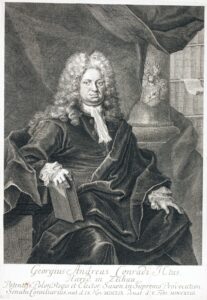
Gabriel Horn (1587 – 1653). Gabriel was the son of Caspar Horn (1556 – 1618) and Maria Budewitz / Budewicz (1559 – 1635). On 18 May 1613 he married Anna Kohler. She was born in Freiberg on 11 December, 1590, the daughter of Friedrich Köhler and Magdalena Röhling. Anna died on 14 November 1658 in Freiberg. Gabriel Horn was a City Councilor of Freiberg and “and well-deserved chamberlain” who on his death on 9 October 1653 was rewarded with a funeral book titled: Dikaiobrabeion: Gläubiger Christen Belohnung und Ehren-Danck … from which we learn that his body was deposited in the chapel near the cathedral on 16 October.
Another funeral book was published titled: Gabriel Horn S. T. Th. Politoxma Coeleste Viro Prudentia atque Integritate animi Spectatissimo Dno Gabrieli Hornio … which gives the detail that: “As he departed from this place he calmly expressed his gratitude to the survivors, who grieved and consoled their relatives and friends.” and which includes contributions by Johann Caspar Horn both senior and junior; Georg Trainer; and Johann Christopher Horn, as shown below:
Justina Horn (1619 – 1657) was the daughter of the above Gabriel and Anna (Kohler) Horn. On 13th September 1653, Justina married Nicolaus Grefe (1620 – 1672) and several nuptial books were published such as: Novellis Coniugibus Dn. M. Nicolao Grefio, Freibergensi, Patr. Hodie-Conrectori Nec Non Iustinae Horniae Piissimae Virgini, and Katachysmata Apollinea quibus Virum Per-Eximium atque Clarissimum Dn. M. Nicolaum Grefium Freiberg S.S. Theolog. Candidat … which included contributions by her father Gabriel Horn and Johann Caspar Horn. Another wedding book bore the title: Lucerna Coniugalis pervigil In festivissimis Apauliois … Dn. M. Nicolai Grefi[i] Freiberg. SS … One of the contributors to the nuptial book was Oswald Cronberger / Kronberger (see Kronberger family below).
An third nuptial book was titled: Katachysmata Apollinea quibus Virum Per-Eximium atque Clarissimum Dn. M. Nicolaum Grefium Freiberg S.S. Theolog. Candidat. Patriaeque Con-Rectorem dignissimum, Sponsum, Virginemq[ue] … from which we learn that Nicolaus Grefe was a theological student at the time. It included a contribution by Justina’s brother Gabriel Horn.
When Justina died on 9 April 1657 several funeral books were published including: Plantuum Moderatrix Praefica, Conducta Viro Cl. Dn M. Nicolao Grefio SS. Theol. C. Gymnas. Patr. Conr … which included contributions by Georg Trainer and Johann Caspar Horn.
Justina’s sister, Anna Catharina Horn (1622–1670), married Caspar Ludwig Schönlebe (1604–1672). He was a merchant, and later councilor and mayor of Freiberg. They were married on 22 October 1644. So far, no bibliographic records have been found that mark this event.
Justina and Anna Catharina’s brother, Gabriel Horn Jnr died on 13 May 1659 and a funeral book was published which included a contribution by Gabriel’s brother in law Caspar Ludwig Schönlebe and his wife Anna Catherine (Horn), and Gabriel’s brother in law Nicolaus Grefe and his wife Justina (Horn).
In 1643 Michael Horn, the son of Hieronymous and Katharina (Hilliger) Horn (see chart), died and a funeral book published – Christianorum Mercatorum Brabeium Christlicher HandelsLeute Gewin und Uberschuß Aus denen Worten David Psal. 16. v. 12. Du thust mir kund den Weg zum Leben … from which we learn that Michael was a noble citizen, court creator, and merchant of Freiberg who on 29 April died and was ‘honestly buried’ on the 4th of May near the cathedral. A number of family members contributed to the book including: Johann Caspar Horn, Gabriel Horn, and Friedrich Horn.
Martin Albert, born in Geithain on November 1, 1642, went to the Marienberg school and later to the Freiberg high school. Adopted as a child by the then mayor Sigismund Horn and later appointed as his heir. Martin studied in Jena from 1664 to 1667 and then went traveling for several years after that. In 1669 he married Gottfried Horn’s widow (see above) and after her death in 1708, he married the daughter of the town councilor Gottfried Braun. Of Martin’s children only two sons survived him, of which the older, Gottfried Sigismund, served in the court of Frederick, Margrave of Brandenburg-Bayreuth (1711 – 1763), and the younger, Gotthelf Sigismund, was elected on various parochial councils such as that at Krummenhennersdorf and Niederschöna.
Martin Albert joined the Freiberg town council in 1670 and stayed there constantly until his death, which took place in 1718. He was mayor 15 times and confirmed as such by the King of Poland and Elector of Saxony. He owned the knightly estates Troschenreuth, Wiedersberg, Krummenhennersdorf and Niederschöna, also in the city of Freiberg a large house on Burggasse (the Besser’iche), over whose door can be found to this day the Albert’s coat of arms.
Johann Caspar Horn (1606-1671), Dr of medicine and philosophy, doctor in Chemnitz, from 1637 in Freiberg. He married Anna Margarethe Lindener [Lindner]; and they had a son also named Johann Caspar (1636 – 1722). However it has not been clearly established among the genealogical databases that in fact Johann Caspar belongs to this Horn family despite living in Freiberg, marrying into the Linder / Lindener family, and being referenced by members of the Schonlebe family and others. Many databases identify Joachimsthal, Böhmen, as Johann Caspar Snr.’s birthplace, suggesting that he later moved to Freiberg. So, although we include Johann Caspar and his son on this website, we are NOT fully committed to them being part of “our” Horn family.
Johann Caspar Snr. dabbled in composing music, whereas his son was a lawyer and took musical composition much more seriously than his father. In 1641 three friends: Johann Lindner, Johann Caspar Horn Snr., and Friedrich Lingkio published Chelys Inauguralis. Ad Calendas Ianuarii Latinas. Anni M.DC.XLI. Pro felici exoptatoq[ue] ineuntis huius Anni Auspicio confecta & consecrata .. where they identify themselves as: “Those Three Lovers of Divine Music”. In 1661 Johann Caspar along with two other inter-related family members Johann Lindner and Theodore Neffe contributed to the book: Malagmata Pausilypa Viro … Dn. Samueli Quellmaltzio auff Halß Medicinae Doctori Celeberrimo & Practico Felicissimo, Obitum quanquam beatum, acerbiorem tamen quo magis insperatum,....
In 1664 Johann Caspar Snr. published: Der bund-gefärbten Flora Lust-erweckendes Feld- und Garten-Spiel So wohl auch Dero Durch den lustigen Cosmus überreichetes Blumen-Geschencke ..
Below, Johann Caspar Jnr’s handwritten score: Undt nach sechs Tagen nahm Jesus zu sich Petrum p C. A. T. B., 2. Violini., 2. Viola da Braccio., Violon et Basso Continuo. : Dominica 6. post Trium Regum …
In 1664 some verses, dedicated to Johann Caspar Horn, Snr. were published titled: Der bund-gefärbten Flora Lust-erweckendes Feld- und Garten-Spie … and in 1665 Georg Adam Struve, Fredrich Bechmann and Johann Caspar Horn published: Honoris augmentaum non ambitione, sed labore, ad unumquemque convenit devenire …
In 1665 Johann Caspar Jnr. passed his law exams and to mark the occaision a book was published titled: Acclamationes Votivae … Viro Amplissimo … Friedemanno Bechmanno … Decano Spectabili Dn. Christophoro Falcknero … Amplissimus Consultissimus … in which a number of family members such as Georg Adam Struve, Christopher Philipp Richter, and Friedemann Bechmann made contributions which praised the “ … noble, renowned Johann Caspar Horn [Jnr.] of Chemnitz who had achieved the supreme rank of Doctor of Law, on the 7th March in the year of 1665.”
In about 1681 Johann Caspar Horn (Jnr.) composed Schaffe in mir Gott ein reines Herz – Mus.1811-E-500 …
In 1691 Johann Caspar Horn, Jnr. published his musical composition: Geistliche Harmonien über die gewöhnlichen Evangelia. [2], Der Sommer-Theil … that runs some 1,500 pages.
In 1693 Johann Caspar Jnr. published a celebratory book on the visit to Dresden on 26 January of that year of John George IV, Elector of Saxony, under the title: Als Der Durchlauchtigste Fürst und Herr/ Herr Johann Georg der Viert Hertzog zu Sachsen … which included an illustration of what the elector wore on the occaision.
In 1665 the brothers Johann Ernst and Jonas Schönlebe published: Cornu Copiae, ex Summis in Utroque Iure Honoribus Viro … Dn. Johanni Casparo Horn Chemniz. Misnico, Die 7. Martii in Templo Collegi collatis Patriae … in honor of their cousin Johann Caspar Horn Jnr. The relationship between Horn and the Schonlebes derives from the Lindener / Lindner sisters one of whom, Anna Margarethe Lindener, married Johann Caspar Horn Snr. and the other, Marie Magdalene Lindener, who married Jonas Schonlebe.
The relationship among the Lindener family itself and between it and the Horn family is a little obsure, however Georg Adam’s Exercitatio Iuridica VI. De Restitutionibus In Integrum … , published in 1646, included contributions by Johann Lindner Snr and Johann jnr, as well as Christian Tannenberg.
Anna Magdalena (Horn) Schirmer was the daughter of Johan Caspar Horn (1606 – 1671) and Anna Margaretha Lindner and the sister of Johann Caspar Horn (1636 – 1722). In 1651 she married the Reverend Michael Schirmer (1635 – 1672) who was the headmaster of the the Freiberg city school. At least three wedding books were published to celebrate the marriage: i) Tabula Honoris ad Thalamum Viri … Dn. M. Michaelis Schirmeri …, ii) Divinum. Umbraculum. Membro. Quondam. Lectissimo. Viro … Dn. M. Michaeli. Schirmero, Gymnasii…. , and iii) Divinam Protectionem Connubialem, Viro Pereximo Clarissimoq[ue] …
As a pastor Schirmer made contributions to wedding and funeral books such as: Als Der Wol-Ehrenveste Achtbahre und der Buchdrucker-Kunst rühmlichst erfahrne… in 1667 and Praesidium Grande … Sebastianum Gottfried Starck in 1670. Both these books also contain a contribution made by Georg Trainer, the headmaster of the Freiberg gymnasium whose family is described on this website here.
A funeral book in honor of Sigimund Horn: Honori Extimo Ac Memoriae Viri Nobiliss. … Dni Sigismundi Hornii Ex Celeberi Horniorum …. is of interest in the number of inter-related family members who made contributions to it including: Johann Caspar Horn, August Schonlebe, Johann Christoph Horn, Georg Trainer, Michael Schirmer, etc. see the Horn family page.
Anna Schönleben (born on November 30, 1585) who had married the lawyer Wolfgang Seyfert from Annaberg around 1610, was godmother to the poet David Schirmer (29 May 1623 – 1686) from Pappendorf. We are not sure yet if and how Michael and David Schirmer are related but we are working on it …
BARBARA HORN
The existence of this particular Barbara Horn is brought to us by a funeral sermon book titled: Iugum Generis Humani, Das Joch Menschliches Geschlechtes. Das ist: Eine Christliche LeichPredigt … Bey dem Volckreichen Begrebnüß … from which we learn that Barbara was the widow of Hans Holewein, a Freiberg merchant. Barbara died on 23 February 1617 and was buried in the Thumb-Kirchen on the 28th. Her funeral sermon book is extensive, over 50 pages in length. Her place on the Horn family tree is obscure.
It MAYBE that the above Barbara was the daughter of Martin Horn and Katherina Vogel. If so, Barbara MAY HAVE had a sister Margarethe Horn †1622 who married Zacharias Tanneberg †1603. Margarethe and Zacharias had a daughter, Ann Tannenberg, born 4 February 1592 at Freiberg, deceased 16 April 1638 aged 46 years. Anna married on 8 June 1610, Freiberg, Johann Lindner / Lindener (1584-1662). Children:
- Johannes Lindner married Elisabeth Seyfarth
- Maria Magdalena Lindner †1662 married Jonas Schonlebe ( – 1658)
- Jacob Lindner married Anna Elisabeth Bachmann
- Anna Margarita Lindner married Johann Caspar Horn (1606 – (see above)
Anna (Tannenberg) Lindner had a sister Magdalena Tannenberg (1597 – 1642) who married Heinrich Schonleben.
